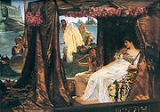
Antony and Cleopatra
Antony and Cleopatra is a historical tragedy by William Shakespeare, originally printed in the First Folio of 1623. Most scholars believe it was written in 1606–07; some researchers, however, argue for an earlier dating of around 1603–04.
Act I
- Nay, but this dotage of our general's
O'erflows the measure.- Philo, scene i
- There's beggary in the love that can be reckon'd.
- Antony, scene i
- In nature's infinite book of secrecy
A little I can read.- Soothsayer, scene ii
- He was dispos'd to mirth; but on the sudden
A Roman thought hath struck him.- Cleopatra, scene ii
- This grief is crowned with consolation.
- Enobarbus, scene ii
- Eternity was in our lips and eyes.
- Cleopatra, scene iii
- Give me to drink mandragora.
- Cleopatra, scene v
- Where’s my serpent of old Nile?
For so he calls me.- Cleopatra, speaking of Antony, scene v
- I was
A morsel for a monarch.- Cleopatra, scene v
- My salad days,
When I was green in judgment, cold in blood,
To say as I said then!- Cleopatra, scene v
Act II
- Epicurean cooks
Sharpen with cloyless sauce his appetite.- Pompey, scene i
- Small to greater matters must give way.
- Lepidus, scene ii
- The barge she sat in, like a burnish'd throne,
Burnt on the water; the poop was beaten gold;
Purple the sails, and so perfumed, that
The winds were love-sick with them; the oars were silver,
Which to the tune of flutes kept stroke, and made
The water which they beat to follow faster,
As amorous of their strokes. For her own person,
It beggar'd all description.- Enobarbus, scene ii
- Age cannot wither her, nor custom stale
Her infinite variety; other women cloy
The appetites they feed; but she makes hungry
Where most she satisfies: for vilest things
Become themselves in her, that the holy priests
Bless her when she is riggish.- Enobarbus, scene ii
- I have not kept my square; but that to come
Shall all be done by the rule.- Antony, scene iii
- If thou dost play with him at any game,
Thou art sure to lose; and, of that natural luck,
He beats thee 'gainst the odds; thy lustre thickens
When he shines by.- Soothsayer, scene iii
- ’T was merry when
You wager’d on your angling; when your diver
Did hang a salt-fish on his hook, which he
With fervency drew up.- Charmian, scene v
- Come, thou monarch of the vine,
Plumpy Bacchus with pink eyne!- Singer, scene vii
Act III
- Who does i’ the wars more than his captain can,
Becomes his captain’s captain; and ambition,
The soldier’s virtue, rather makes choice of loss,
Than gain which darkens him.- Ventidius, scene i
- Tell him, he wears the rose
Of youth upon him.- Antony, scene xiii
- Men’s judgments are
A parcel of their fortunes; and things outward
Do draw the inward quality after them,
To suffer all alike.- Enobarbus, scene xiii
Act IV
- To business that we love we rise betime,
And go to ’t with delight.- Antony, scene iv
- This morning, like the spirit of a youth
That means to be of note, begins betimes.- Antony, scene iv
- The shirt of Nessus is upon me.
- Antony, scene xii
- Antony: Sometime we see a cloud that’s dragonish;
A vapour sometime like a bear or lion,
A tower’d citadel, a pendent rock,
A forked mountain, or blue promontory
With trees upon ’t, that nod unto the world,
And mock our eyes with air: thou hast seen these signs?
They are black vesper's pageants.
Enorbarbus: Ay, my lord.
Antony: That which is now a horse, even with a thought
The rack dislimns, and makes it indistinct,
As water is in water.- Scene xiv
- Since Cleopatra died,
I have liv’d in such dishonour, that the gods
Detest my baseness.- Antony, scene xiv
- I am dying, Egypt, dying; only
I here impórtune death a while, until
Of many thousand kisses the poor last
I lay upon thy lips.- Antony, scene xv
- O, wither’d is the garland of the war!
The soldier’s pole is fall'n; young boys and girls
Are level now with men; the odds is gone,
And there is nothing left remarkable
Beneath the visiting moon.- Cleopatra,
- Good sirs, take heart: —
We'll bury him; and then, what's brave, what's noble,
Let's do it after the high Roman fashion,
And make Death proud to take us. Come, away:
This case of that huge spirit now is cold. —
Ah, women, women! — come; we have no friend
But resolution, and the briefest end.- Cleopatra, scene xv
Act V
- For his bounty,
There was no winter in ’t; an autumn ’t was,
That grew the more by reaping.- Cleopatra, scene ii
- If there be, or ever were, one such,
It’s past the size of dreaming.- Cleopatra, scene ii
- Mechanic slaves
With greasy aprons, rules, and hammers, shall
Uplift us to the view; in their thick breath,
Rank with gross diet, shall we be enclouded,
And forc'd to drink their vapour.- Cleopatra, scene ii
- I have
Immortal longings in me.- Cleopatra, scene ii
- Come, thou mortal wretch,
With thy sharp teeth this knot intrinsicate
Of life at once untie: poor venomous fool,
Be angry, and dispatch. O, couldst thou speak,
That I might hear thee call great Caesar Ass
Unpolicied!- Cleopatra, scene ii
- Peace, peace!
Dost thou not see my baby at my breast,
That sucks the nurse asleep?- Cleopatra, scene ii
